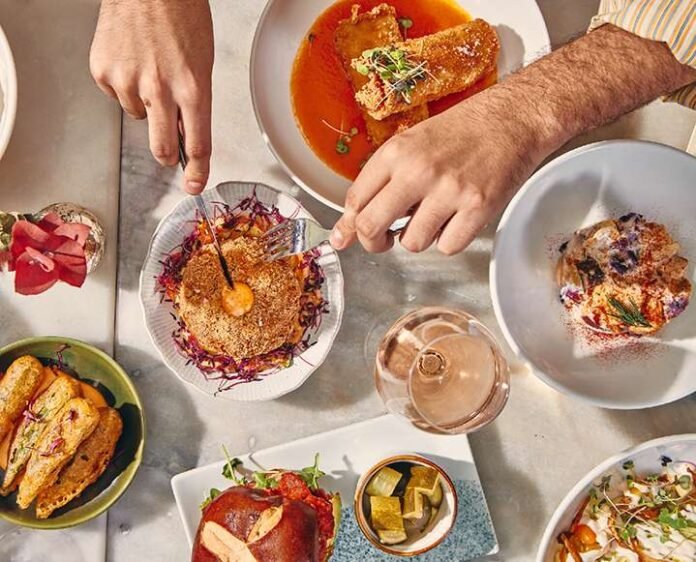Hidden in the lively streets of LA, Ubuntu is shaking up the food scene with its fresh take on West African cuisine, all plant-based and incredibly delicious. At the center of it all is Chef Shenarri Freeman, a James Beard-nominated chef who’s putting her African roots front and center. Her dishes at Ubuntu are a perfect mix of traditional flavors and modern, plant-forward twists. Every bite tells a story, making it an experience you don’t want to miss. If you’re looking to explore African cuisine in a whole new way, Ubuntu is the spot to be.

Shenarri, your restaurant Ubuntu in Los Angeles has been a celebration of your roots and travels across the African continent. Could you share how specific experiences from your travels directly inspired some of the signature dishes at Ubuntu?
All of my food experiences help contribute to the Ubuntu palette. Visiting the markets in different countries and different regions helps bring the most inspiration. Followed by cooking with these ingredients and seeing how I can implement them into my style of cooking.
Los Angeles is renowned for its culinary diversity, drawing influences from various cultures and cuisines. Did the city’s unique demographic play a role in your decision to establish Ubuntu here? Additionally, how has the vibrant local food scene shaped your culinary techniques and the development of Ubuntu’s menu?
I would say the produce and accessibility is something that prompted Ubuntu more than the demographic. Here in LA we are a lot further from West Africa as opposed to the rest of the country, in fact we’re the furthest. However, when I dine out in LA and explore different restaurants, it’s always refreshing to see what other chefs are doing on the scene and how local and seasonal food inspires everyone.

What’s one ingredient that you love to use that might surprise people?
Probably not a surprise at this point but I use Old Bay seasoning in our Fonio grits. It’s a nice spin on southern style grits. Something people may be familiar with if they’ve spent time eating on the east coast or in the south.
Each dish at Ubuntu tells a story, transporting diners to places like Senegal, Nigeria, and Ghana through taste. Can you walk us through your creative process when you reinterpret these traditional dishes for a contemporary audience?
Traveling plays a major role in everything. I think it’s important to explore West African cuisine in West Africa to get a better understanding of it. It’s not just one thing, one way and in one place. There’s an abundance of information to absorb. Research is another big one. I spend a lot of time reading cookbooks, articles, food media, food festivals, cooking with friends, and asking questions. I like fully immersing myself when I’m in recipe development mode.
Tell me about Soul Food Sundays at Ubuntu
At our restaurant Cadence in New York, I’m cooking plant based soul food with dishes such as Southern Fried Lasagna, Fried Oyster Mushroom & Waffles, Biscuits & Gravy, Jambalaya Arancini and more. It’s been so popular, we decided to bring it to our Los Angeles community so they can enjoy it as well. We do it every Sunday from 2-8 p.m.

Being named a Forbes 30 Under 30 recipient highlights your impact in the culinary world. How do you see your role in challenging and reshaping the narrative around African cuisine in the American culinary scene?
African cuisine has always had a global influence, the media is just now coming around to it. I am honored to be leading a restaurant with a cuisine to contribute to the conversation. My narrative is focused on vegetables, which can be a challenge within itself but it all comes down to storytelling.
You’ve been nominated for two James Beard Awards, how has this recognition influenced your career and Ubuntu’s mission? Do you feel it has changed guest expectations or the way your culinary contributions are perceived?
Luckily I don’t get too caught up in accolades. It is certainly something to be proud of and a result of hard work but my motivation stems from helping out my community and doing my part as a chef. With all recognition and awards, there’s a spotlight put on you, so it’s important to continue to show up. I’m sure there are expectations but it doesn’t influence how I operate.
What advice would you give to young chefs who are looking to carve out a niche in the competitive culinary scene, especially in specialized areas like plant-based cuisine?
Figure out the “why” and then learn the “how.”
If you were stranded on a desert island and could only make one dish from the Ubuntu menu, which one would it be and why?
Probably the Maafe Stew! I’m a soup + stew person and I just really enjoy the flavors of this peanut butter stew
Looking ahead, what kind of legacy do you want to leave with Ubuntu, and are there any new projects or initiatives you are excited about that will further involve or benefit the community?
I would love to see more plant forward restaurants specializing in African cuisines. I hope this concept influences other chefs around the world to do so.

